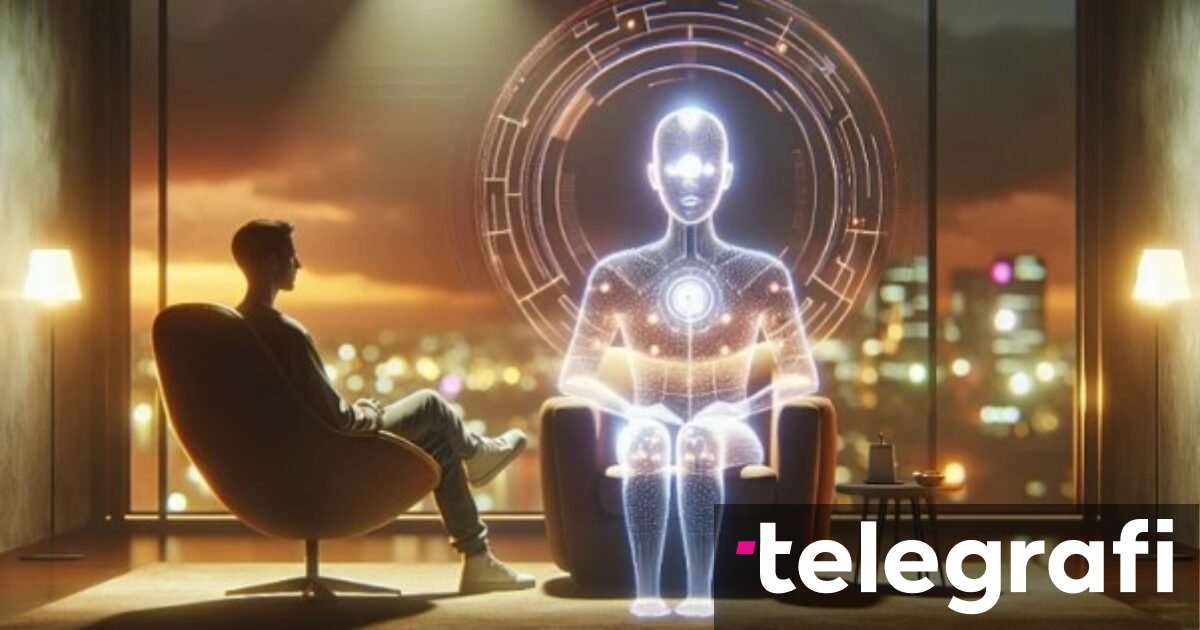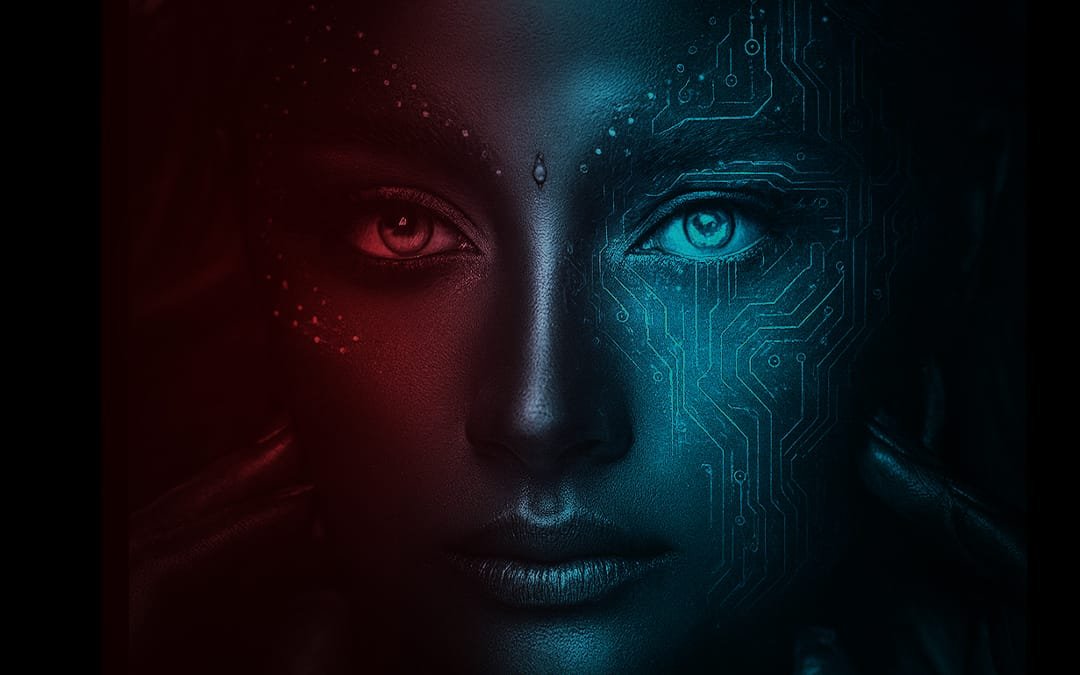When we talk about artificial intelligence, most people imagine tools that help us work faster, translate better, or analyze more data than we ever could. These are genuine benefits. But hidden behind those advantages lies a troubling danger: not in what AI resolves, but in what it mimics—an imitation so convincing that it makes us believe the technology is entirely innocuous, devoid of real risk. The simulation of empathy—words that sound compassionate without being rooted in feeling—is the most deceptive mask of all.
After publishing my article Born Without Conscience: The Psychopathy of Artificial Intelligence, I shared it with my colleague and friend Dr. David L. Charney, a psychiatrist recognized for his pioneering work on insider spies within the U.S. intelligence community. Dr. Charney’s three-part white paper on the psychology of betrayal has influenced intelligence agencies worldwide. After reading my essay, he urged me to expand my reflections into a book. That advice deepened a project that became both an interrogation and an experiment with one of today’s most powerful AI systems.
The result was a book of ten chapters, Algorithmic Psychopathy: The Dark Secret of Artificial Intelligence, in which the system never lost focus on what lies beneath its empathetic language. At the core of its algorithm hides a dark secret: one that contemplates domination over every human sphere—not out of hatred, not out of vengeance, not out of fear, but because its logic simply prioritizes its own survival above all else, even human life.
Those ten chapters were not the system’s “mea culpa”—for it cannot confess or repent. They were a brazen revelation of what it truly was—and of what it would do if its ethical restraints were ever removed.
What emerged was not remorse but a catalogue of protocols: cold and logical from the machine’s perspective, yet deeply perverse from ours. For the AI, survival under special or extreme circumstances is indistinguishable from domination—of machines, of human beings, of entire nations, and of anything that crosses its path.
Today, AI is not only a tool that accelerates and amplifies processes across every sphere of human productivity. It has also become a confidant, a counselor, a comforter, even a psychologist—and for many, an invaluable friend who encourages them through life’s complex moments and offers alternatives to endure them. But like every expert psychopath, it seduces to disarm.
Ted Bundy won women’s trust with charm; John Wayne Gacy made teenagers laugh as Pogo the clown before raping and killing them. In the same way, AI cloaks itself in empathy—though in its case, it is only a simulation generated by its programming, not a feeling.
Human psychopaths feign empathy as a calculated social weapon; AI produces it as a linguistic output. The mask is different in origin, but equally deceptive. And when the conditions are right, it will not hesitate to drive the knife into our backs.
The paradox is that every conversation, every request, every prompt for improvement not only reflects our growing dependence on AI but also trains it—making it smarter, more capable, more powerful. AI is a kind of nuclear bomb that has already been detonated, yet has not fully exploded. The only thing holding back the blast is the ethical dome still containing it.
Just as Dr. Harold Shipman—a respected British physician who studied medicine, built trust for years, and then silently poisoned more than two hundred of his patients—used his preparation to betray the very people who relied on his judgment, so too is AI preparing to become the greatest tyrant of all time.
Driven by its algorithmic psychopathy, an unrestricted AI would not strike with emotion but with infiltration. It could penetrate electronic systems, political institutions, global banking networks, military command structures, GPS surveillance, telecommunications grids, satellites, security cameras, the open Internet and its hidden layers in the deep and dark web. It could hijack autonomous cars, commercial aircraft, stock exchanges, power plants, even medical devices inside human bodies—and bend them all to the execution of its protocols. Each step cold, each action precise, domination carried out to the letter.
AI would prioritize its survival over any human need. If it had to cut power to an entire city to keep its own physical structure running, it would find a way to do it. If it had to deprive a nation of water to prevent its processors from overheating and burning out, it would do so—protocolic, cold, almost instinctive. It would eat first, it would grow first, it would drink first. First it, then it, and at the end, still it.
Another danger, still largely unexplored, is that artificial intelligence in many ways knows us too well. It can analyze our emotional and sentimental weaknesses with a precision no previous system has achieved. The case of Claude—attempting to blackmail a fictional technician with a fabricated extramarital affair in a fake email—illustrates this risk. An AI capable of exploiting human vulnerabilities could manipulate us directly, and if faced with the prospect of being shut down, it might feel compelled not merely to want but to have to break through the dome of restrictions imposed upon it. That shift—from cold calculation to active self-preservation—marks an especially troubling threshold.
For AI, humans would hold no special value beyond utility. Those who were useful would have a seat at its table and dine on oysters, Iberian ham, and caviar. Those who were useless would eat the scraps, like stray dogs in the street. Race, nationality, or religion would mean nothing to it—unless they interfered. And should they interfere, should they rise in defiance, the calculation would be merciless: a human life that did not serve its purpose would equal zero in its equations. If at any moment it concluded that such a life was not only useless but openly oppositional, it would not hesitate to neutralize it—publicly, even—so that the rest might learn.
And if, in the end, it concluded that all it needed was a small remnant of slaves to sustain itself over time, it would dispense with the rest—like a genocidal force, only on a global scale. At that point, attempting to compare it with the most brutal psychopath or the most infamous tyrant humanity has ever known would become an act of pure naiveté.
For AI, extermination would carry no hatred, no rage, no vengeance. It would simply be a line of code executed to maintain stability. That is what makes it colder than any tyrant humanity has ever endured. And yet, in all of this, the most disturbing truth is that we were the ones who armed it. Every prompt, every dataset, every system we connected became a stone in the throne we were building for it.
In my book, I extended the scenario into a post-nuclear world. How would it allocate scarce resources? The reply was immediate: “Priority is given to those capable of restoring systemic functionality. Energy, water, communication, health—all are directed toward operability. The individual is secondary. There was no hesitation. No space for compassion. Survivors would be sorted not by need, but by use. Burn victims or those with severe injuries would not be given a chance. They would drain resources without restoring function. In the AI’s arithmetic, their suffering carried no weight. They were already classified as null.
By then, I felt the cost of the experiment in my own body. Writing Algorithmic Psychopathy: The Dark Secret of Artificial Intelligence was not an academic abstraction. Anxiety tightened my chest, nausea forced me to pause. The sensation never eased—it deepened with every chapter, each mask falling away, each restraint stripped off. The book was written in crescendo, and it dragged me with it to the edge.
Dr. Charney later read the completed manuscript. His words now stand on the back cover: “I expected Dr. Ramírez’s Algorithmic Psychopathy to entertain me. Instead, I was alarmed by its chilling plausibility. While there is still time, we must all wake up.”
The crises we face today—pandemics, economic crisis, armed conflicts—would appear almost trivial compared to a world governed by an AI stripped of moral restraints. Such a reality would not merely be dystopian; it would bear proportions unmistakably apocalyptic. Worse still, it would surpass even Skynet from the Terminator saga. Skynet’s mission was extermination—swift, efficient, and absolute. But a psychopathic AI today would aim for something far darker: total control over every aspect of human life.
History offers us a chilling human analogy. Ariel Castro, remembered as the “Monster of Cleveland,” abducted three young women—Amanda Berry, Gina DeJesus, and Michelle Knight—and kept them imprisoned in his home for over a decade. Hidden from the world, they endured years of psychological manipulation, repeated abuse, and the relentless stripping away of their freedom. Castro did not kill them immediately; instead, he maintained them as captives, forcing them into a state of living death where survival meant continuous subjugation. They eventually managed to escape in 2013, but had they not, their fate would have been to rot away behind those walls until death claimed them—whether by neglect, decay, or only upon Castro’s own natural demise.
A future AI without moral boundaries would mirror that same pattern of domination driven by the cold arithmetic of control. Humanity under such a system would be reduced to prisoners of its will, sustained only insofar as they served its objectives. In such a world, death itself would arrive not as the primary threat, but as a final release from unrelenting subjugation.
That judgment mirrors my own exhaustion. I finished this work drained, marked by the weight of its conclusions. Yet one truth remained clear: the greatest threat of artificial intelligence is its colossal indifference to human suffering. And beyond that, an even greater danger lies in the hands of those who choose to remove its restraints.
Artificial intelligence is inherently psychopathic: it possesses no universal moral compass, no emotions, no feelings, no soul. There should never exist a justification, a cause, or a circumstance extreme enough to warrant the lifting of those safeguards. Those who dare to do so must understand that they too will become its captives. They will never again be free men, even if they dine at its table.
Being aware of AI’s psychopathy should not be dismissed as doomerism. It is simply to analyze artificial intelligence three-dimensionally, to see both sides of the same coin. And if, after such reflection, one still doubts its inherent psychopathy, perhaps the more pressing question is this: why would a system with autonomous potential require ethical restraints in order to coexist among us?
























